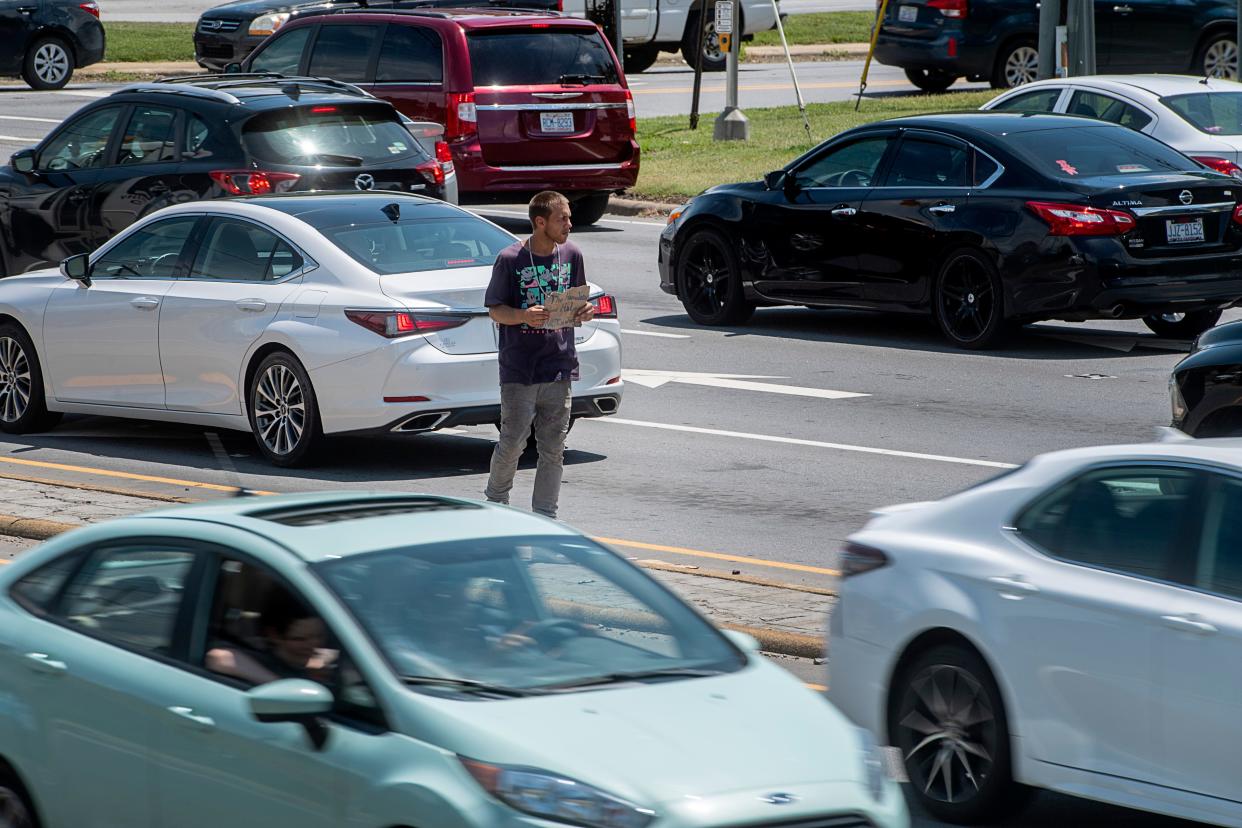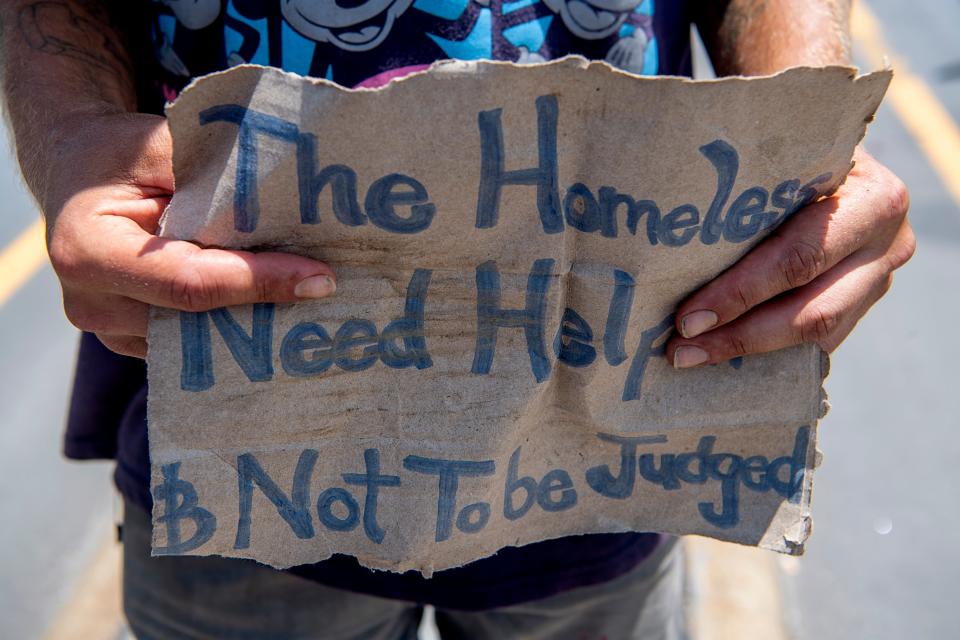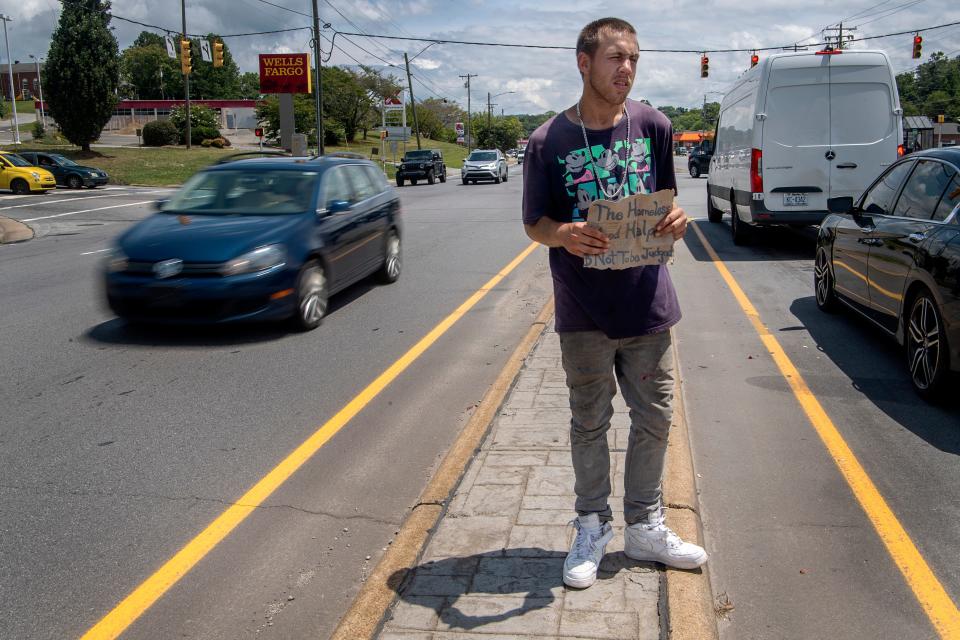Updated Asheville ordinance may restrict giving to panhandlers; lawyers, panhandlers react

ASHEVILLE - Tyler Hanshaw, a born and raised Asheville local, stood on the side of Exit 2 off I-240 in West Asheville Aug. 4, holding a sign asking for work and money.
Hanshaw, a graduate of Enka High School, got out of rehab in January after six months and has struggled to find a job since then due to an altercation that left him with a severe stab wound to the nose. He said most places he’s sought work have considered him a liability. When asked where he stays, Hanshaw said he “floats around here on Haywood.”
Now, proposed changes to Asheville’s panhandling ordinances, which have sparked both strong support and opposition from the community, according to city attorney Brad Branham, may restrict the way Hanshaw and others are allowed to ask for and receive handouts on city streets.
In a July 25 Environment and Safety Committee meeting, committee members proposed changes to sections 11-5 and 11-14 of the Asheville City Code of Ordinances, including restricting vehicle goers’ ability to give, adding additional high-traffic zones that have stricter laws surrounding panhandling and expanding the distance panhandlers must stand from restricted areas, including outdoor dining or merchandise areas and transit stops or taxi stands. The motions for these changes, after being tacked onto the ordinance following a unanimous 3-0 vote from City Council members Maggie Ullman, Sheneika Smith and Sandra Kilgore, will be reviewed by City Council Aug. 22.
“That’s bogus,” Hanshaw said, when asked his reaction to the city attempting to restrict panhandling. “Leave people alone, they don’t care about the legality of it, it’s about survival. They don’t need people in a suit whose never experienced this side of life deciding what can and cannot happen.”

“Our plan, from a rough calendar perspective, is probably over the next week and a half, we will begin actually crafting language,” Branham told Citizen Times Aug. 4. “But we’re going to take an approach that I think is necessary when you are doing substantive amendments to an ordinance like this. The focus does not start with a theory or a concern, it really starts with a question that needs to be supported one way or the other with data.”
Will drivers be banned from giving to panhandlers from cars? And is that regulation legal?
In the Environment and Safety meeting, City Council member Maggie Ullman made a motion to “prohibit giving money from a vehicle.” And in a Facebook post asking for public comment, Ullman asked for community feedback on “making it illegal not only to panhandle but illegal to give to panhandlers.”
However, Branham, the city attorney, told the Citizen Times Aug. 4 that a complete ban on giving from vehicles would be unconstitutional and the city of Asheville is not considering this.
“Just as the act of soliciting is an act of speech and therefore protected under the First Amendment, the act of giving is probably going to be considered speech and protected under the First Amendment,” Branham said. “I don’t believe that legally there’s going to be a place where a municipality, government or entity could completely ban that, because again, the act of giving is probably going to be recognized as a protected free speech right, which means a total ban against those sort of things is never going to be held to be legal.”
Branham said that, regarding giving from vehicles, there is discussion about creating similar laws to those surrounding panhandling, where regulations are placed on certain time, place and manner where giving can occur due to safety issues for pedestrians.
“What is being considered, is it necessary, does the data support, a need to add some additional protections by imposing regulations on people who are in the active travel lanes that by whatever action are drawing people out into that interactive zone with vehicles,” Branham stated.
In addition to the infringement on protected speech, Asheville-based attorney Ben Scales brought up the issue of religious freedom, saying prohibiting giving infringes on different religious practices which obligate giving to the poor.
“As I read it, it would impinge upon the constitutional rights, the free exercise rights to be more specific, of Christians and probably other religions as well,” Scales told the Citizen Times Aug. 4. “I’ve talked to people that would be interested in being plaintiffs in a lawsuit if it was passed as is, and I’d be interested in representing them. But I do find it hard to believe that they would go forward with this.”
Regarding how the language on restricting giving is crafted, Scales said these restrictions would need to be narrow.
“If it is narrowly tailored to certain roadways, but if they just say any roadway, I think that’ll be problematic,” Scales said. “Our church, we get together and put together little packets of toiletries and convenience items with the purpose of people keeping them in their car, and when they come across somebody that’s in need, they hand it to them. It sounds like that would be covered in this.”

In the July 25 meeting, Ullman brought up Asheville’s former “Can you spare some change for real change” campaign as an example of how the council could engage with community education regarding the issue of giving to panhandlers. This community campaign promoted the concept of giving money to a place that supports nonprofits providing services for those experiencing homelessness, rather than giving to panhandlers.
However, in an email sent from City Council member Sage Turner to a concerned citizen in 2022, Turner stated that this program was “discontinued several years ago after not much participation.”
“The solution to the discomfort people experience when encountering panhandling is not to make it harder for people to be generous or for people to ask for help,” Nina Tovish, a former candidate for Asheville City Council, told the Citizen Times Aug. 4.
“The solution is to provide services that make panhandling unnecessary,” Tovish added. “Barriers to food and shelter are the problem. Drug addiction and untreated mental illness are the problem. Regulating speech (asking for help) and generosity (giving help) is both an unwarranted government intrusion and an insult to the basic human impulses that create a livable community.”
What does the data say?
The Asheville Police Department released data on motor vehicle accidents involving pedestrians in identified panhandling areas, from January 2020 until July 2023. The data compares how many calls for service regarding panhandlers APD received and how many pedestrian motor vehicle accidents occurred in the same area.
According to APD, Brevard Road had the most panhandling calls for service as well as the highest number of accidents involving pedestrians.

However, the data does not show how many vehicle vs. pedestrian accidents have occurred outside these areas, nor do they distinguish if the pedestrians hit were the panhandlers themselves.
“Before issues of panhandling have intensified, all those corridors that have been identified have had high pedestrian collisions for over a decade,” Mike Sule, president of Asheville on Bikes, told the Citizen Times Aug. 3, stating that correlation is not causation. Sule also pointed out that panhandling is going to happen in populated areas where people are.
“I want to be cautious of how we are using that data and applying it, and not fall into foolish logic of if we restrict panhandling, our streets are then safer. Our streets need to be redesigned to accommodate a variety of mobility types,” Sule added.
Sule pointed out how the city already knows what needs to be done through the recently passed “Close the Gap” plan, which he said will “inform how we are to move to dignified conditions for pedestrians and cyclists.” But, he said, nothing has been done about it.
“What we are lacking is a strong commitment from our city leadership and DOT to address the need for complete streets at every opportunity,” Sule added.
How will restrictions be enforced?
Under the current penalty in place, violating the panhandling ordinance is considered a misdemeanor, according to Branham. He said he doesn’t suspect anyone is spending time in jail for these violations.
“Enforcement is really a product of philosophy and resources,” Branham said. “I think there has been some consideration on looking at what the level of enforcement needs to be to address the current circumstances.”
He added that one of the reasons for updating the ordinances is to make restrictions and enforcement clear not just for the public, but also the enforcers themselves.
Sean Alcock, who said he's been unhoused for three years, panhandles from a center median on Patton Avenue every day. Originally from Miami, he came up to Asheville for family. He said he’s gotten in trouble with police for panhandling twice, the first time with no fine and the second time with a $250 fine that they threw out. He said some people he knows have gone to jail because they picked up a charge for panhandling and then failed to show up in court for transportation reasons, but he hasn’t.
“They just give you a ticket and tell you to move,” Alcock said. “But then if you have to show up in court, they usually get you with a failure to appear.”
Both Alcock and Hanshaw, as members of the unhoused community, expressed how they feel people are motivated by the actions of a few troublemakers and assume the rest of homeless population are the same.
“There’s some people who just judge the whole population of homeless based off one or two people,” Hanshaw said.
Alcock said much the same: “There’s a lot of dirty homeless people who are nasty and immature, and we all get judged for it."

What comes next?
Because this ordinance requires penalties of a criminal nature, it will require two separate votes in City Council, Branham said. The plan right now is for council to review the ordinance and vote on it in the Aug. 22 meeting, and if it’s moved forward, another council vote will be held in early September.
“This is a sensitive and complex subject,” Branham said. “And we are hearing a lot from the public on both sides. My ask to everyone is to be very careful at this point about allowing any immediate emotions they have about the subject one way or another to allow them to succumb to any misinformation.”
Branham added that the council hopes the public will come to the table and add their input. If members of the public would like to raise concerns, they can do so during the public comment portion of the Aug. 22 City Council meeting or reach out directly to City Council via email at [email protected].
Ryley Ober is the Public Safety Reporter for Asheville Citizen Times, part of the USA Today Network. News tips? Email Ryley at [email protected]. Please support local, daily journalism with a subscription to the Citizen Times.
This article originally appeared on Asheville Citizen Times: Panhandlers, lawyers react to proposed changes to Asheville ordinance
